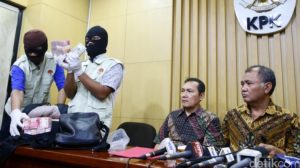
The Corruption Eradication Commission (KPK) is concerned with the bribery case that ensnared Chairman of Commission D of the Jakarta City Council Mohamad Sanusi.
Sydney, 25 Rajab 1437/03 May 2016 (MINA) – It’s vital for Indonesia, which is struggling to increase tax revenue, to stamp out corrupt activities wherever possible.
A developing country with a population of 250 million, Indonesia is Southeast Asia’s biggest economy. But Indonesia has only 27 million registered taxpayers. The Economist reported that fewer than a million people paid what they owed in 2014,theconversation reported, aa qoted by Mi’raj Islamic News Agency (MINA).
Indonesia’s high levels of perceived corruption contribute to this non-compliance. It has long been suggested that when taxpayers perceive high levels of corruption exist they are less likely to contribute to government revenue by voluntarily complying with their tax obligations.
In response, the government has placed a lot of emphasis on seeking to reduce petty corruption. In the tax domain, the government has carried out corruption risk mapping, by implementing a rigorous internal control system and code of conduct within the Directorate General of Taxation and by selecting tax officials with high integrity and strong organisational values.
Also Read: Global Campaign Calls for One Day Strike in Solidarity for Palestinian Prisoners
But our research found that although petty public corruption cannot be ignored, the government may get the biggest “bang for the buck” in tax collection by focusing more on stamping out a type of corruption we call “grand corruption”. This is corruption by the highest levels of government and tax officials.
Different types of corruption
We recently conducted research in Indonesia examining how perceptions of different forms of public sector corruption may influence intentional tax under-reporting behaviour.
The research confirms a critical link between perceptions of the level of corruption in a society and the willingness of citizens to report their income and pay their taxes.
Also Read: Israel Announces Holding Two Martyrs’ Bodies
Our research also shows that corruption by politicians and public officials deemed “high and mighty” by the public has a greater negative impact on tax compliance than corruption by minor officials.
For the study, we classified different types of corruption into “grand corruption” and “petty corruption”.
We also distinguished corruption in the Directorate General of Taxation from corrupt activities in all other government sectors.
As a result, we identified five different types of perceptions of corruption: grand corruption; grand tax corruption; petty corruption; petty tax corruption; and a fifth category that embraced all four of these categories – general corruption.
Also Read: Israeli Military Infiltrates Gaza Borders, Raze Lands
High levels of perceived corruption
To find out the levels of perceived corruption, we interviewed tax officers, tax advisers and taxpayers and surveyed nearly 400 employed and self-employed taxpayers across Indonesia.
The research established, quite predictably, that high levels of perceived corruption were evident across the country.
Even the most cursory glance at Transparency International’s latest Corruption Perceptions Index would tell you that Indonesia does not perform very well in this area. Indonesia ranked 88th out of 167 countries worldwide. This is well behind neighbouring countries such as Singapore, which ranked 8th, Australia (13th) and Malaysia (54th).
Also Read: Government Assures Debts Used Prudently
“Grease money” acceptable but not “grand corruption”
Overall, perceptions of high levels of “general corruption”, together with perceptions of high levels of “grand corruption” and “grand tax corruption”, had the most significant impact on whether or not a taxpayer intended to report all of their income to the tax authority.
Surprisingly, where taxpayers considered levels of petty corruption by government officials or tax officials to be high, the relationship between corruption and tax compliance was not so strong. Survey respondents were not so inclined to hide their taxable income.
Perhaps taxpayers take for granted that there will be some localised and minor corruption in their day-to-day dealings with government officials. It seems that people’s tax reporting behaviour is not greatly affected by the existence of “grease money” practices.
Also Read: Indonesian President Joko Widodo to visit New Zealand
But when they see the “big boys” engaging in corrupt behaviour (and presumably getting away with it), that impels them not to be as good taxpaying citizens as they otherwise would be.
The outcomes of the research have significant policy implications. Only when “grand corruption” has been eradicated will citizens more likely be willing to comply with their tax obligations. (T/R07/R01)
Mi’raj Islamic News Agency (MINA)
Also Read: Starbucks Bombing Victim Surprises Indonesian Judges by Hugging His Alleged Attacker




























 Mina Indonesia
Mina Indonesia Mina Arabic
Mina Arabic